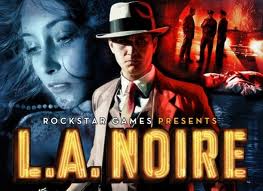
Judging whether Rockstar's latest, LA Noire is artistically successful hinges on two things. The first is whether it fits into the genre its purports. The second is whether it does so well. The answers are yes, and hell yes.
Film noir wasn't so much a genre as it was a movement, spanning the 1940s and 50s. Saying where it began is difficult (and pointless), but a good argument could be made that the first was The Maltese Falcon, and the last is almost always considered to be Touch of Evil. Visually the films were shot with unconventional lighting, often overhead lamps and emphasizing silhouettes and shadows. Typically these films follow investigators, usually reprehensible men who nonetheless are behaving the least abominably of all the characters we meet. (Even Sam Spade in Falcon was a petty cad, having his murdered partner's name removed from the front door of the office before the body was cold, even as it is strongly suggested he was sleeping with the partner's wife.) Sometimes these were cops, but often they were private investigators or insurance investigators (especially Double Indemnity and The Killers). Other times the investigation was led by a person put in such circumstances (Out of the Past, The Lady from Shanghai, and almost any Hitchcock film with Cary Grant come to mind immediately).
But the most important character in noir was the city. This city was almost always either LA or San Francisco. Car chases and tailing are a staple, as are mingling with movie moguls, drug lords, mobsters, and magnates. In this case, LA Noire takes place in Los Angeles (obviously), and every part of the city feels right. Set in 1947 and featuring historically correct streets and buildings, the city is awash with vivid details---black and hispanic parts of town, new housing developments for GIs, the wealthy districts along Santa Monica, and the dumpy real structures behind the movie industry. Even the famous Hollywoodland sign is represented faithfully (though I believe the H was by that time in disrepair).
Noir has never really been out of fashion, but the tenor of it has certainly undergone some changes. The initial films were made under the strict studio "Code", prohibiting most of the grisly murder details and sexual escapades that the genre practically demands. Again, in The Maltese Falcon, it is clearly indicated that Gutman, Cairo, and Wilmer are part of a gay cabal, out to enrich themselves by obtaining the Falcon. One wonders how the film's director, John Houston who also adapted the screenplay, figured out how to get the suggestion into the film without the censors noticing it. By Kiss Me Deadly, the rules had loosened significantly---sex wasn't just implied anymore, and the protagonist is a bottom feeder who seduces men's wives while his partner takes pictures, only to sell the pictures to the men for use in divorce proceedings. Obviously, by the time of the superb LA Confidential, everything was on the table: horrible violence, rape, rough sex, prostitution, gay sex, rampant drug use.
All of that and more is represented in LA Noire. Cole Phelps gets knocked around between divisions as good investigating and bad politics influence events. Yes, the Elizabeth Short "Black Dahlia" case is explored to a certain extent. But mainly these are creative, original works, wonderfully drawn, and featuring the kind of moral ambiguity that I find hard to resist.
The game is essentially a modern-day adventure game. The action is relatively rare, relatively quick, and totally painless (in that you are always given an option to skip it.) Most of the game is either spent detecting, by combing crime scenes for clues, or in interviewing/interrogation. And it's all in here: a cop with a checkered past in the war, dirty cops, corrupt politicians, gangsters, unscrupulous businessmen, junkies, and whores. Noire features the most advanced face motion capture and rendering ever attempted, and it basically succeeds. Famous actors are instantly recognizable ("that's SO Walter from Fringe"). When speaking to contemptible smug villains, cagey low-rung criminals, or wide-eyed patrolmen, all of it feels just like it should.
However, not appearing from the adventure genre: ridiculous inventory puzzles, profuse pixel hunting, operation of absurd machines, fetch quests, unforeseeable deaths, or just finding yourself not knowing what to do next.
The complaints leveled at the game by Yahtzee of Zero Punctuation are valid. The motion capture for bodies leads to some weird animation, and the conversation paths are ambiguous enough that you'll probably want to consult a FAQ. And yes, Cole sometimes yells when it doesn't make sense to. Some of the details of the plot get obscured, and at one point it seemed to me that there were facts the characters knew that hadn't yet been revealed. These are serious complaints. But none of them really comes close to diminishing the game.
Finally: the music is divine. In cars you hear a selection of popular tunes from the day. Outside, though, is a rich soundtrack of original jazz pieces featuring trumpet player Gerard Presencer. It never gets old.





